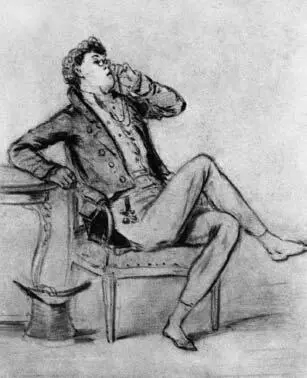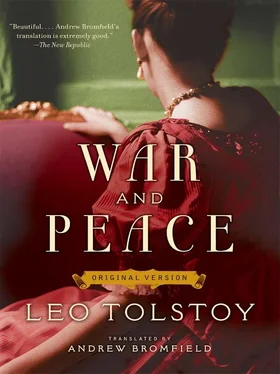1 ...7 8 9 11 12 13 ...29 The vicomte bowed slightly as a token of acquiescence and smiled courteously. Anna Pavlovna walked round the vicomte and invited everyone to listen to his story.
“The vicomte was personally acquainted with the duke,” Anna Pavlovna whispered to one person.
“The vicomte is a marvellous raconteur,” she declared to another.
“So obviously a man of good society,” she said to a third, and thus the vicomte was served up to the company in a tasteful manner in the best possible light, like roast beef on a hot dish garnished with fresh green herbs.
The vicomte, about to begin his story, gave a delicate smile.
“Move over here, chère Hélène,” said Anna Pavlovna to the beautiful princess, who was sitting a little distance away, at the centre of a different circle.
Princess Hélène was smiling. She stood up, wearing that same constant smile of a perfectly beautiful woman with which she had entered the drawing room. With a slight rustle of her white ball gown trimmed with its plush and fur, and a gleam of white shoulders, glossy hair and diamonds, she stepped between the men who had made way for her and, looking at none of them, but smiling at all as though obligingly granting each one the right to admire the beauty of her figure and well-formed shoulders and her bosom and her back that were greatly exposed in the fashion of the day, and seeming to bring with her all the splendour of a ball, she went over to Anna Pavlovna. Hélène was so lovely that not only was there not a shade of coquetry to be seen in her, but she seemed, on the contrary, to be ashamed of the all-too-overwhelming power of her undeniable beauty. It was as though she wished to diminish her beauty and could not. “What a beautiful woman!” said all who saw her.
As though overcome by something quite extraordinary, the vicomte shrugged his shoulders and lowered his eyes as she seated herself before him and illuminated him with that same unvarying smile.
“Madame, truly I fear for my abilities before such an audience,” he said, bowing his head and smiling.
The princess, finding it needless to respond, rested the elbow of her shapely, exposed arm on the table. She waited, smiling. Throughout the whole story she sat up straight, glancing occasionally either at her beautiful, well-fleshed arm, the shape of which had changed in pressing against the table, or at her even more beautiful bosom, on which she adjusted her diamond necklace; several times she rearranged the folds of her gown and every time that she was impressed by something in the story, she glanced round at Anna Pavlovna and immediately assumed the very same expression that the lady-in-waiting’s face wore, then settled once again into her radiant smile. Following Hélène, the little princess had also come over from the tea table.
“Attendez-moi, I’ll get my needlework,” she said. “Now, what ever are you thinking of?” she asked, addressing Prince Hippolyte. “Fetch me my ridicule.”
The little princess, smiling and chatting on all sides, promptly made everyone shuffle about as she took her place, and then cheerfully sat rearranging herself.
“Now I’m all right,” she said and, requesting them to begin, she took up her work. Prince Hippolyte, after bringing her work-bag, had gone round behind her and, drawing up an armchair, sat close beside her.
The charming Hippolyte was striking for his uncommon resemblance to his beautiful sister, but even more for the fact that, despite the resemblance, he was amazingly ugly. The features of his face were precisely the same as those of his sister, but in her case everything was constantly illuminated by a buoyant, self-sufficient, youthfully vital smile and an exceptional, classical beauty of body, while in the brother’s case, on the contrary, the same face was clouded by idiocy and invariably expressed a self-opinionated peevishness, while the body was puny and weak. The eyes, nose and mouth – all seemed to be clenched into a single indeterminate, dull grimace, and the hands and legs always assumed unnatural positions.
“It isn’t a ghost story, is it?” he asked, having seated himself beside the princess and hastily set his lorgnette to his eyes, as though he could not speak without this instrument.
“Most decidedly not, my dear fellow,” said the astonished storyteller, with a shrug of his shoulders.
“The thing is, I absolutely detest ghost stories,” he said in a tone that made it clear that he uttered words first and only realised what they meant afterwards.
Because he spoke with such self-confidence, no one could tell whether what he had said was very clever or very stupid. He was dressed in a dark-green frock coat and knee-breeches in the flesh-pink shade that he called cuisse de nymphe éffrayée, with stockings and shoes. He had seated himself as far back as possible in the armchair, facing the raconteur, and placed one hand, with one plain and one engraved signet ring, upon the table in front of him in such an outstretched pose that it clearly cost him a great deal of effort to maintain it at that distance, and yet he held it there throughout the story. In the palm of his other hand he clasped his lorgnette, teasing up with that same hand the curly “titus” coiffure that lent his elongated face an even odder expression and, as though he had just remembered something, he began looking first at his hand with the rings, extended in display, then at the vicomte’s feet, and then he twisted himself entirely around with a rapid, lurching movement, the way he did everything, and stared long and hard at the Princess Bolkonskaya.

HIPPOLYTE KURAGIN Drawing by M.S. Bashilov, 1866
“When I had the good fortune to see the late lamented Duc d’Enghien for the last time,” the vicomte began in a tone of mournful elegance, surveying his listeners, “he spoke in the most flattering terms of the beauty and genius of the great Mademoiselle Georges. Who does not know this brilliant and charming woman? I expressed my surprise as to how the duke could have come to know her, not having been in Paris in recent years. The duke smiled and told me that Paris is not as far from Mannheim as it might seem. I was horrified and informed his highness of my terror at the thought of his visiting Paris. ‘Sir,’ I said, ‘God only knows whether even here we are not surrounded by turncoats and traitors and whether your presence in Paris, no matter how secret it may be, is not known to Buonaparte!’ But the duke only smiled at my words with the chivalry and courage which constitute the distinguishing trait of his line.”
“The house of Condé is a branch of laurel grafted on to the tree of the Bourbons, as Pitt recently said,” Prince Vasily pronounced in a monotone, as though he were dictating to some invisible clerk.
“Monsieur Pitt put it very well,” his son Hippolyte added laconically, twisting abruptly on his armchair, his trunk in one direction and his legs in the other, after hastily snatching up his lorgnette and directing his sights at his parent.
“In short,” continued the vicomte, addressing himself primarily to the beautiful Princess Hélène, who kept her gaze fixed on him, “I had to leave Etenheim and only later learned that the duke, in the impetuosity of his valour, had travelled to Paris and paid Mademoiselle Georges the honour not only of admiring her, but also of visiting her.”
“But he had an attachment of the heart for the Princess Charlotte de Rohan Rochefort,” Anna Pavlovna interrupted passionately. “They said that he was secretly married to her,” she added, evidently frightened by the imminent content of this tale, which seemed to her too free in the presence of a young girl.
Читать дальше













